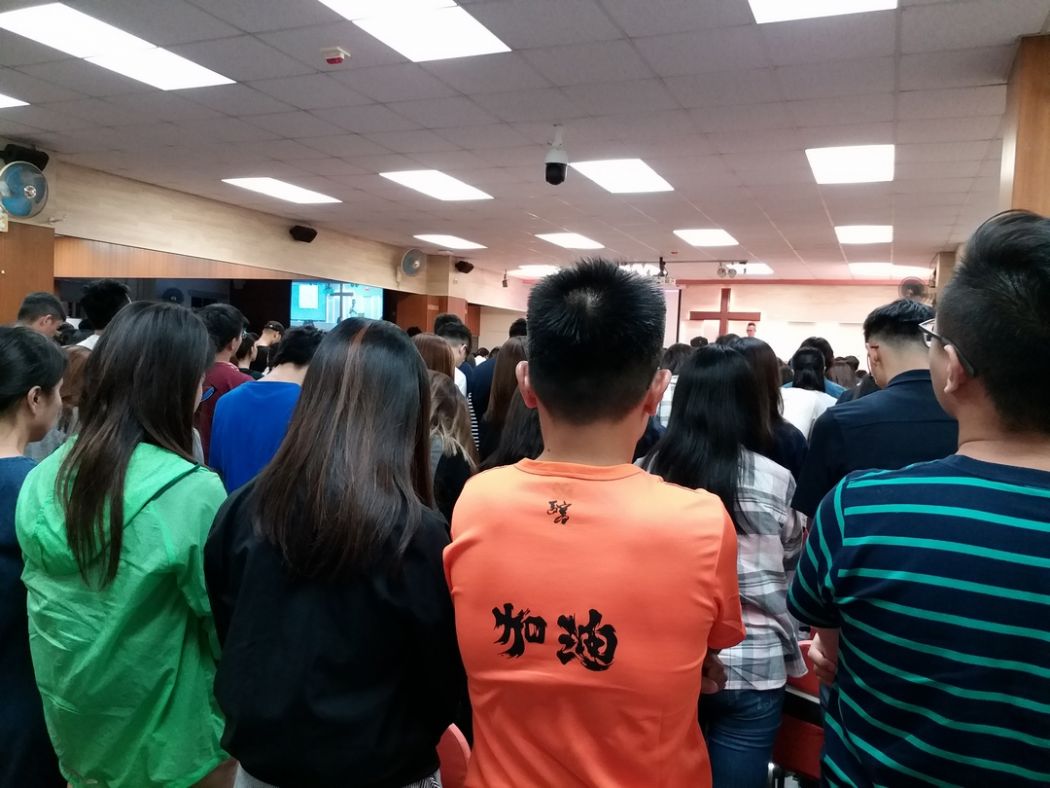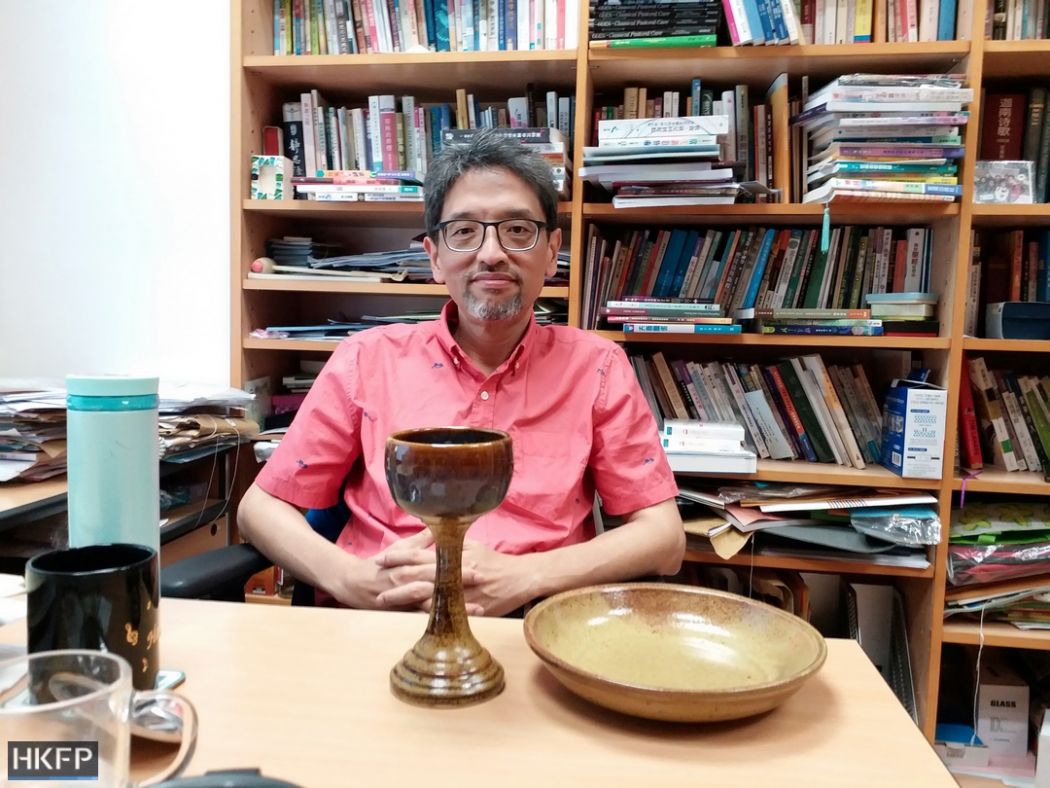Suited up in protest gear, Peter Wong (not his real name) also wore a vest that identified him as a pastor. A police officer, noting Wong’s outfit, told the frontline pastor that he too was a Christian as he asked which church Wong was from.
The pastor told the policeman that they were all from the same Church, then removed his mask. The officer’s face remained concealed, but his eyes indicated that he was smiling at Wong.
That was on October 1, the National Day Hongkongers would remember for the first instance of a police officer shooting a live bullet at a demonstrator in the protest movement triggered by the now-withdrawn extradition bill.

The series of anti-extradition protests that began in June is now entering its fifth month. Christians – who make up 11 per cent of the population – have also been engaging with the social movement.
In June, the hymn Sing Hallelujah to the Lord rang out as an unofficial protest anthem. Prayer meetings, more frequent and urgent, have spread beyond church walls to the Legislative Council Complex and onto various street corners.
Holding oversized crosses and church banners, believers marched with the masses. Christian groups delivered petitions to the chief executive and held press conferences to condemn police violence. Standing between the police and protesters, volunteers from Protect the Children – headed by pastor Roy Chan – have been shielding young frontline demonstrators with their bodies.

As the protest movement stretches on and violence escalates, the gap between pro-democracy yellow and pro-government blue citizens deepens. The crack cuts through congregations as well.
One pastor – who did not wish to be named – told HKFP that he has been suppressing his own political stance since the 2014 Umbrella Movement, in order to be able to talk to church members from both sides of the spectrum.
Despite his reticence, extreme yellow – and blue – ribbon congregants have already left. The minister values unity and fears once he voices his opinion, the remaining congregation will split. His preaching has focused on God, love and peace.

But to maintain peace, believers can’t talk and pray about the current social issues they really care about, he acknowledges.
A church for the sheep gone AWOL
While some churches eschew politics for the sake of unity, Flow Church keeps politics at the pulpit in search of a different kind of unity: bringing back believers who have left church but not the faith.
Members walking out on churches from disappointment with the institution’s political stance, or lack of one, is nothing new. Hong Kong churches have been losing members since the Umbrella Movement five years ago.
No longer churchgoers but still Christians, some of these believers have found their way to Dr John Chan’s Facebook page “theologia autumnitas rosea est” (“theology is a pink autumn”).

The page, which contains theological reflections on politics from the Alliance Bible Seminary professor, has attracted over 30,000 subscribers. In a September entry, Chan referred to the latest protest anthem Glory to Hong Kong and discussed whether glory, usually reserved for God, can be appropriately applied to Hong Kong. (The answer was “yes.”)
It was to reach the unchurched demographic that Chan started Flow Church, whose regular services began in January. On the evening of October 12, over 300 people – mostly in their 20’s, 30’s and 40’s – packed out the Shek Kip Mei hall.
They sang, prayed and listened to a sermon on prayer. Preaching from Philippians 1 with humour, audience participation and references to social issues, pastor Poon Chi Kong also expressed doubt over the rumour that protesters had been paid to demonstrate.
While the mission of Flow Church is to bring back the disillusioned faithful, the exact number of members who fit that category is not known, according to Poon. But the fact that it is reaching a sizable crowd is evident from Facebook numbers. The Saturday before, a Facebook livestream replaced the onsite church service due to protest-related transport disruption.
Chan preached via video on the parable of the unjust judge, whom he compared to Chief Executive Carrie Lam. He encouraged believers to keep praying, because God, the ultimate judge, is just. That recording has been viewed 43,000 times and shared over 350 times.
“We welcome you”
Across Victoria Harbour, the towering reddish-brown Chinese Methodist Church on Hennessy Road is a landmark millions of protesters have passed. On the way from Victoria Park to the Admiralty government headquarters, an estimated two million Hongkongers marched past the Wan Chai church on June 16.
The week before, a million demonstrators took the same route. Weary marchers have entered the church to rest.
As 1.7 million citizens again took to the streets on August 18, the sanctuary buzzed with activity. Protesters streamed in to escape the downpour. Ushers directed visitors to the restrooms. A team of volunteer medical professionals was on standby, as was a group of pastors.

This Wan Chai church is one of the places of worship that offers shelter on demonstration days. Christian organisations, such as Christian Times and the Hong Kong Pastors Joint Declarations Committee, list churches on their Facebook page that are open.
Poon Yuk Kuen, pastor of Chinese Methodist Church, recalls frightened citizens coming in for refuge during police clearance actions from previous protests. “Some people have told us when they come in here they feel peace, even people who are not Christian.”
Sympathetic toward demonstrators, Poon stresses: “We welcome all kinds of different people, not just march participants… when there are clashes and tear gas and they need to come in here for shelter.” When the police were dealing with a swine flu case at a nearby hotel, the church opened up its basement for the officers to use as a base.

“No matter what kind of person you are, we welcome you, because this is to fulfil our faith. We are willing to love everyone with the love of Jesus Christ.”
Listening their way to reconciliation
Sitting in a small group, Julie So fought the urge to question the police officer in their midst. I’m not here to ask, I’m here to listen, she told herself.
So – not her real name – was one of the participants in the guided listening activity “Listen—to others, self and God” on September 21. An organising committee made up of two seminary professors, two university professors, a police officer, a retired police officer and a university Christian fellowship staffer had extended invitations for the event to people they knew.
Around 60 believers of different political views gathered on a university campus that Saturday. They were divided into groups of up to seven members. Each group had at least one police officer or one family member of an officer.
Listening is a start for reconciliation, according to the event facilitator the Rev Timothy Au, a professor of the China Graduate School of Theology. Concerned and saddened by the split in the Church, Au hopes to rebuild relationships with police brothers- and sisters-in-Christ.

“If you’re not Christian, this rift would be even more difficult to bridge because – with such different political views – it’s impossible. But Christians never got together because of politics. We get together because of our faith, because of Christ – so it’s not right to separate due to different political viewpoints.”
To encourage listening, the exercise follows a fixed structure. The participant to start the round has four minutes to share feelings and experiences from the previous months of protest. Group members then have three minutes to reflect on and respond to what they just heard.
The round concludes with three minutes for the group to pray for the person who first shared. In a group of seven participants, it takes 70 minutes to complete the exercise for everyone.
For So, just sitting close to a police brother-in-Christ was already a big breakthrough.
In another group, a pastor of a Hong Kong Island church listened to a woman speak. It was halfway into her talk before she revealed her identity as a police officer. The minister was able to listen to her first as a person, rather than as an officer.
Inviting members of the police force to join this event was not easy. Some police officers have felt out of place in church, especially one that’s siding with Hong Kong youths who’ve been driving the protest movement. Some officers feel judged by other church members.
That people of opposing views would even come and be willing to listen to someone else is already a big accomplishment, said Au. Although reconciliation is the ultimate goal, it is a complicated and distant one.
Having participated in “Listen,” the pastor from the Hong Kong Island church, who had heard from the female police officer in his group, repeated the activity with his own congregation: “Every beginning is a small beginning,” said Au.
Hong Kong Free Press relies on direct reader support. Help safeguard independent journalism and press freedom as we invest more in freelancers, overtime, safety gear & insurance during this summer’s protests. 10 ways to support us.

